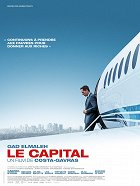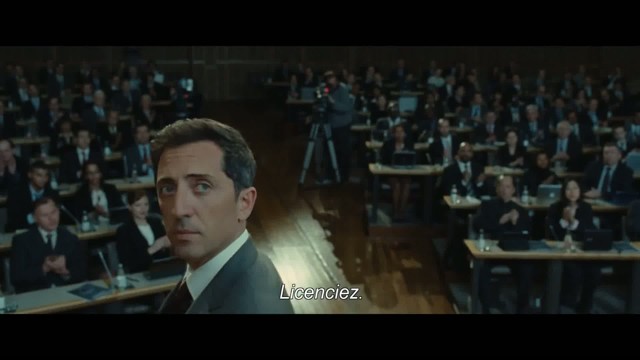Ohjaus:
Costa-GavrasKuvaus:
Eric GautierSävellys:
Armand AmarNäyttelijät:
Gad Elmaleh, Gabriel Byrne, Natacha Régnier, Liya Kebede, Céline Sallette, Hippolyte Girardot, Bernard Le Coq, Olga Grumberg, Daniel Mesguich (lisää)Suoratoistopalvelut (1)
Juonikuvaukset(1)
When the CEO of France's Phenix Bank collapses on the golf course, Machiavellian young executive Marc Tourneuil (Gad Elmaleh, Midnight in Paris) is crowned as his replacement. A whirlwind of ruthless ambition, power struggles, greed and deception ensues as Tourneuil's brutal ascent is jeopardized by a hostile takeover attempt from a large American hedge fund led by Dittmar Rigule (Gabriel Byrne, Vikings, In Treatment), erotic distractions from international supermodel Nassim (Liya Kebede), and adversaries with an agenda for destruction. Capital is a pointed commentary on how the Darwinian world of contemporary capitalism plays itself out across the global financial stage. Based on the book Le Capital by Stéphane Osmont, the film is directed by Costa-Gavras and written by Costa-Gavras, Jean-Claude Grumberg and Karim Boukercha. The film also stars Natacha Regnier and Celine Sallette. (Cohen Media Group)
(lisää)Arvostelut (5)
Capital is about the modern capitalism – who would have thought. It’s about people who have every ordinary person’s money under control. It’s a thriller about people who play their dangerous games in which loss comes far too quickly and a win is taken for granted, because the only other option is social death. Costa-Gavras filmed it very harshly. And Gad Elmaleh’s acting was just as brutal. The scene where he’s having a lunch with his colleague in some shabby worker’s pub is unforgettable. I’d probably stare just like they did. If I met a politician in my favorite pub, I’d wouldn’t be able to cope either.
()
Intellectual exploitation. Everything you've ever thought about global capital, predatory capitalism and high banking management all in one film, where the characters are just a function of a legible ideological message (which I agree with, but which I do not enjoy in this pamphlet form). Sometimes it is ridiculous (Pacman with bank logos that is supposed to shed light on the principle of a key transaction, a director who needs a consultant to shed light on the fact that if he swallows a bank with 80% of toxic assets, he'll have a problem, etc.), but mostly it is a desperately sterile and unsatisfying film, because it only shows theses and model situations - golf, luxury whores, redneck American managers (from Goldman Sachs), the distortion of painters' names, an estranged son addicted to computer games, a sexually frustrated protagonist, and old ethical bankers, etc. If I'm wrong and this movie is a really realistic depiction of the lives of elites, then it's great news, because soon everyone will want idiocy, frustration and boredom. The dominant impression for me was that Costa Gavras wanted to make a film that would be like a motionless surface, under which it boils with tension... but in reality, however, there is a sterile, tiled bottom underneath. [40%]
()
Costa-Gavras has never been the type of director to mind the label of an activist creator, especially one with a clear political profile. He makes this perfectly clear with his new film. Even the title, which deliberately evokes associations with the world-famous title by Karl Marx, connects the world of bankers and financial corporations with the world of political ideas. While Oliver Stone once made Wall Street, where his left-wing political convictions occasionally flashed through the dialogue of a suspenseful thriller about an unscrupulous stockbroker, Costa-Gavras made a film that proudly embraces leftist ideals and sometimes transitions into straightforward proclamations. The (anti)hero of the film turns to the camera and addresses the audience in key moments, thinking out loud and revealing even what would normally remain cloaked in diplomatic phrases. Paradoxically, he becomes a more interesting character than Stone's Gordon Gekko, who is essentially a one-dimensional predator driven by the pursuit of profit. Marc Tourneuil, on the other hand, is a player with more complex motivations and thought processes, aware of the consequences of his actions but determined to stay in the game and to win. With his drama about the rise of an intelligent and ambitious careerist against the backdrop of a power struggle in a globally influential bank, Costa-Gavras has become the spokesperson for those who increasingly observe scandals in the world of high finance with disgust – the irresponsibility and arrogance of the elites, the ruthlessness with which speculators conduct their shady dealings on or beyond the edge of the law. It is important to realize that the described managerial and business practices were not invented by the author of the source material; he drew on intimate knowledge of the environment and specific cases. Gad Elmaleh, known primarily in France, handled the demanding role with honor and is well on his way to breaking into the club of internationally acclaimed film stars. Despite a few minor reservations (such as the rather unnecessary romantic fling with a supermodel, which dilutes the main storyline), I argue that Capital is a film that has balls and has arrived at the right time, marked by an economic crisis and its repercussions. Sometimes it's good not to hold back and to say what needs to be said for it to be heard. Overall impression: 90%.
()
It may seem stereotypical to some but Costa-Gavras clearly did not want to create a subjective human drama, but an objective view of the world of big banks. I dare say that (especially thanks to the catalytic effect of the economic crisis after 2007), the film also has a didactic function in this sense. This is also related to the stereotypical nature of the characters, but what can be done when in a work whose title the film bears (I mean Marx's "Das Kapital," not the book "Le Capital" by Stéphane Osmont, the literary source of this film)? We can read, for example, on page 251: "As a capitalist, he is merely personified capital. His soul is the soul of capital. However, capital has only one life instinct - the instinct to grow, to create surplus value...." It is not surprising then that the left-wing Costa-Gavras could not make the film any other way. Nevertheless, it is definitely not just cliché and predictable, definitely not. The motivation of the main character is not clear from the beginning and the course of events can be said to be doubly unpredictable. These are conventional film techniques that will not bore you even during the runtime of the film's less than two hours.
()
A film about how capitalism looks in today's world, and it's not anything nice because people who come into power are willing to do anything to maintain it, and it doesn't matter how much they smile at you or how much you believe they're telling the truth. There may be a lot of grand hypocrisy behind all this, which this film shows bluntly.
()

